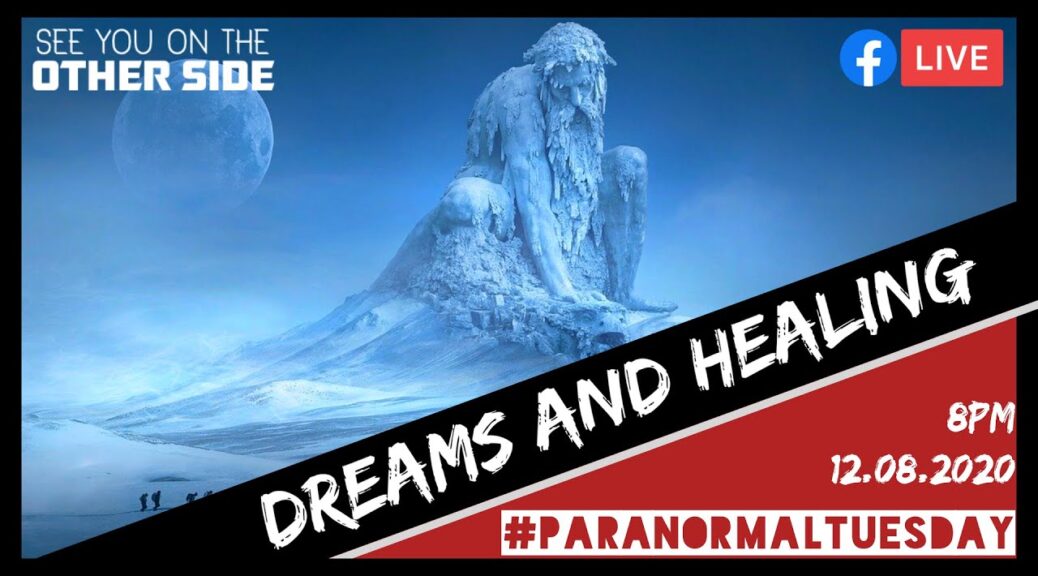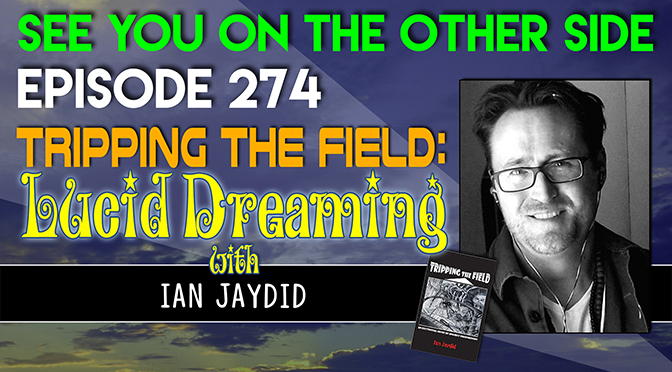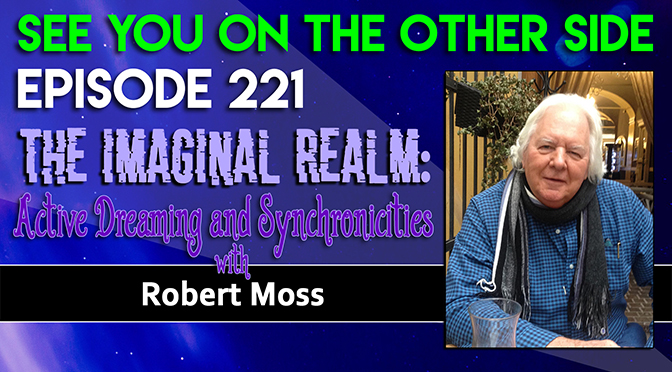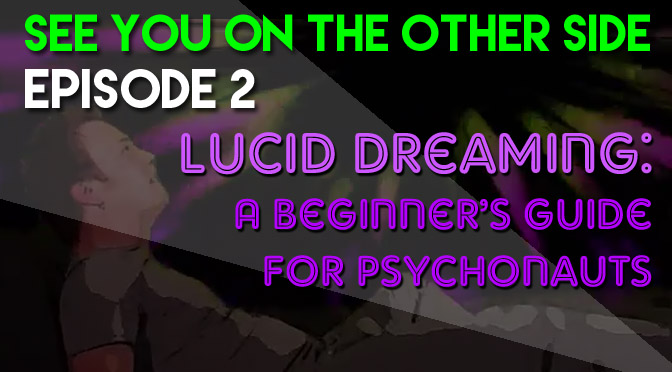Wendy and Mike venture back into the land of lucid dreams and discuss ways that people have used their nighttime Continue reading #ParanormalTuesday – Healing and Dreams
Tag Archives: control your dreams
274 – Tripping The Field: Lucid Dreaming With Ian Jaydid
Podcast: Play in new window | Download
Subscribe: Apple Podcasts | RSS | More
I used to be terrified of going to sleep. Everyone has a nightmare once in awhile, but starting when I was six years old, I’d have them almost every night. I couldn’t just fall asleep, I’d read until the book would fall out of my hands and my eyes closed involuntarily.
I would dread if my parents went to bed before I fell asleep because that would just make things more terrifying, I’d be facing entering the dream world alone. And my dream world hated me. It would find ways to torture me every night with monsters chasing me, child killers cutting me up, or zombies chewing my body parts. After awhile, I just expected it, I felt like the teenagers in A Nightmare On Elm Street, desperate not to fall asleep, because I knew who was waiting for me there, even though I wouldn’t see that movie myself until I was much older.
It wasn’t something that I talked about much because I didn’t expect other kids to understand it. Everyone has bad dreams, but not everyone has them every night. I didn’t want to seem weird or crazy, so I kept it to myself most of the time. And when I had a chance, like when I was at the library, I would look for books on how to control your dreams. I knew there had to be a way.
We discussed this all the way back in our second episode, “Lucid Dreaming: A Beginner’s Guide for Psychonauts” about how I became obssessed with finding ways to escape my nightmares. “Lucid dreaming” means that you know you’re in the dream world and therefore you know that the things you’re seeing in your brain cannot hurt you. I eventually found a way to manage my nightmares through lucidity, but it took several years to get there. It was never as dramatic as the Dream Warriors for me, but it really wasn’t that far off, at least in the dream world.
We spend one-third of our lives unconscious. That’s a long time to be inside a world where everything is trying to kill you. And as I learned, you can’t escape sleep. Once a day, our minds need to be rebooted to function properly and that means that a major portion of our already too short existences are spent doing nothing. Most of the time, dreams don’t make sense, they don’t seem to mean anything. It’s just random synapses firing off little stories in your head.
Sometimes those stories are wonderful, and sometimes, like in my case, they’re horrific. But what if you could control those stories? What if you could do something useful with the hours you’re not awake? Wouldn’t that be awesome? And what if, sometimes in the dream world, you can leave your body behind?

Author, artist, and psychonaut, Ian Jaydid, had his first lucid dream when he was nineteen years old. Then, involuntarily, he started having those dreams every night. While he was always interested in the paranormal world, the experiences that he would have in his dreams would change how he fundamentally views existence.
He calls it “The Narrative”. In the real world, we all share certain beliefs about what is true and what is physically possible. You can’t walk through walls, you can’t fly, etc… In the dream world, “The Narrative” can be completely different. You might be able to talk to cats, you might be able to jump 10 feet high, people who you thought were dead are alive, etc… The rules are different. What’s possible is completely different.
In fact, one of the first things that regular lucid dreamers suggest to do is to try flying in your dreams. We’ve probably all done it involuntarily in a dream at some point, but when you do it purposefully it’s even more amazing. (Some people theorize that witches and broomsticks even come from them using hallucinogenics to simulate the fyling experience!) But we can’ t fly in real life, we don’t have ET helping us out with his psychic powers. It’s impossible. But that’s the kind of thing you can do in your dreams. You can transcend our physical limitations inside a lucid dream.
Ian was lucid dreaming so much that he started testing the limits of what he could experience. He started visiting his friends in his dreams and found out the things that he was seeing weren’t necessarily just in his dreams. His dream encounters changed his “Narrative” and altered what he believed to be possible.
His first book, Tripping the Field: An Existential Crisis of Ungodly Proportions (click here to check it out), is a fiction novel, but it contains the philosophy of what he’s learned in his nocturnal explorations.
In this interview, we talk with Ian Jaydid about his experiences and what inspired his novel and cover these topics:
- Ways that you can try lucid dreaming tonight
- How can you stop yourself from waking when you know you’re in a dream
- Does lucid dreaming make you tired?
- The evidence that caused him to believe he was doing more than just dreaming
- Is it possible to astral travel in your dreams?
You can find more of Ian’s original artwork and writing at his website, ianjaydid.com
For the song this week, we were interested in how lucid dreaming can reframe what Ian Jaydid calls “The Narrative”. It’s like that old cliché, “Whether you think you can or you can’t, you’re right.” Anything is possible in your dreams, the physical limitations in our material universe don’t exist there, anything goes.
There’s a movie from the late 90s called Mumford and there’s one scene that I think about often. In the movie, a man is describing one of his erotic fantasies to his therapist. In the fantasy, the male character is a stunning example of romance novel cover machismo who easily woos beautiful women, but in real life, the man is a total schlub. You think that the guy, Henry Follett, has a totally delusional sense of himself until the doctor is thinking about it later and says this:
“In these fantasies, Henry Follett is played by a handsome guy with biceps. Can you imagine that? Where your self-esteem has to be? Man, I’d just like to move the guy to the point where he gets to appear in his own fantasies.”
He wasn’t even fantasizing about himself. His dreams weren’t his own. Sometimes your narrative is so ingrained that you’re not even the main character in it. That’s when you have to reframe it. That’s the idea behind this song, “Dreams Belong”.
The world is ugly
the world is mean
we’re drowning in cruelty
and there’s only one place I can hide
where I feel like I am free.
Your head spins round and round
your soul trapped on the running wheel
You gotta get out of your mind
if you want to find out what’s real
When the neurons fire
it’s more than just electricity
you can have my body and take my life,
but my dreams belong to me
I’ll close my eyes and fantasize
escape to lucidity
you can have my body and take my life,
but my dreams belong to me
It’s all fake
It’s all a hoax
we’ve all been fed a lie
You’ll never see possibility
until you leave your shell behind
Your head spins round and round
your soul trapped on the running wheel
You gotta get out of your mind
if you want to find out what’s real
When the neurons fire
it’s more than just electricity
you can have my body and take my life,
but my dreams belong to me
I’ll close my eyes and fantasize
escape to lucidity
you can have my body and take my life,
but my dreams belong to me
221 – The Imaginal Realm: Active Dreaming and Synchronicities with Robert Moss
Podcast: Play in new window | Download
Subscribe: Apple Podcasts | RSS | More
If you’re anything like me, you have a love/hate relationship with the dream world. Sure, it can be fun to dream and some whacked out cool things can happen, but nightmares can randomly develop and turn something unusual and strange into something terrifying and soul-crushing in the blink of an eye. I’ve felt ecstasy inside a dream, but I’ve also had bouts of uncontrollable crying and overwhelming pangs of guilt.
And I’m doing it to myself, right? Because dreams, they’re not even real. It’s just a “bit of undigested beef or a blot of mustard“! Well, author and dream teacher Robert Moss doesn’t think so. He calls the dream world “The Imaginal Realm” and believes that we can change our lives by what we see in dreams. He believes that it is a pathway to parallel universes of lives unlived here but fulfilled there. Moss believes dreams are a way to spend time with spiritual beings who live in a different dimension, to talk to the dead, and to receive messages from our higher selves.
Robert Moss has been featured on shows from Charlie Rose to Coast to Coast AM and he joins us to talk about how he uses symbolism (and lots of Jungian psychology) from dreams to help people work through their struggles in waking life.
- How Robert Moss lived a lifetime in a few minutes during a dream he had in a childhood Near-Death Experience
- The dream message that changed his life and led him on a path away from best-selling Cold War thriller novels and onto dream teaching and shamanism
- An almost-miraculous synchronicity with a dominatrix that occurred on an airline flight
- How he helps people deal with and take control of their nightmares
- How to use dreams to speak to the Dead
- The importance of keeping a Dream Journal
- The principles of his Active Dreaming method and how you can start engaging your dreams tonight
Robert Moss’ new book is called Mysterious Realities: Tales from the Imaginal Realm and you can purchase it at his website, www.mossdreams.com
The song this week is a psychedelic dream voyage. “The Land of Nod” is the Biblical place located “east of Eden” where Cain was exiled after he killed his brother Abel. (In fact, in the game Vampire: The Masquerade, Cain is the first vampire and the sacred text of bloodsuckers is called The Book of Nod.) But it’s also a euphemism for dreamland, (you “nod” off to sleep) that was used as early as Jonathan Swift and Robert Louis Stevenson and is still used by authors like Neil Gaiman. And of course we had to shout out some Shakespeare, Poe, and Coleridge (who wrote the world’s most famous unfinished poem inspired by a dream!) Here is Sunspot’s “The Land of Nod”.
We are such stuff it seems
inside in a dream within a dream
a Kubla Khan in Xanadu
A physical transcending
to a world that’s never ending
where the soul does continue
can a lifetime be lived
with what a moment has to give,
Well, the clock is broken anyway
And it is your own creative hand
that flips this to a savage land
where you are nothing more than prey.
Who sent you
You sent you
You’re running
but you can’t move
and You’re trying
your legs are glued
you’re struggling
but you can’t stand
then you’re falling
but you don’t land
and you’re screaming
but there’s no sound
and you’re crying
but your tears drown
inside
before you die
you need to open your eyes
you need to open
We are such stuff it seems
inside in a dream within a dream
a Kubla Khan in Xanadu
A physical transcending
to a world that’s never ending
where the soul does continue
can a lifetime be lived
with what a moment has to give,
Well, the clock is broken anyway
And it is your own creative hand
that flips this to a savage land
where you are nothing more than prey.
Who sent you
You sent you
2 – Lucid Dreaming: A Beginner’s Guide for Psychonauts
Podcast: Play in new window | Download
Subscribe: Apple Podcasts | RSS | More
Have you ever taken control of your own actions while dreaming? In this episode, we delve into the topic of lucid dreaming. Mike shares his experience of studying the process in order to escape nightmares, and Wendy describes a lucid dream in which she could fly.
Featured Song: Hypnogogic from the album Singularity
This song is available on iTunes and also has a video on YouTube. Enjoy!!
Lyrics:
I wake up in the night,
still awake but paralyzed,
and you are there hovering over me.
I can’t believe my eyes,
Trusting myself is unwise,
but there you are still hovering over me.
My better nature tells me,
this is a fairy story,
but without trying I can feel you.
An undigested bit of beef,
brings back of an old motif,
but in this moment you are here.
A waking dream,
of my invention,
does not conform ,
to comprehension,
lost in Hypnogogia again.
These animated figments,
ambiguous in their malignance,
have opened up a portal over me.
Wondering if these phantasms,
are weighing all my malefactions,
and are they here for my reckoning?
A chance to recreate,
the circumstance of my mistakes,
to speak the language of the speechless.
In the shadow of moonlight,
is this the way to make things right,
or are you the core of my weakness?
A waking dream,
of my invention,
does not conform ,
to comprehension,
lost in Hypnogogia again.
Immobile and bedazed,
by the look upon your face,
I am both in awe and terrified.
A moment to connect,
with one I had on such effect,
what urge do you need satisfied?
Apology or a decree,
some rare form of alchemy,
some otherworldy threat,
something that hasn’t happened yet.
Or just some subconscious scheme,
to straighten out this Philistine,
and only a dream.
My better nature tells me,
this is a fairy story,
but without trying I can feel you.
In the shadow of moonlight,
is this the way to make things right,
or are you the core of my weakness?
A waking dream,
of my invention,
does not conform ,
to comprehension,
lost in Hypnogogia again.
Morpheus can read your mind,
Morpheus will always find,
all the things we keep inside,
all the things we try to hide.
Links to Things We Discussed:
Dream On app for iOS – Lucid dreaming app with dream journal
Awoken app for Android – Lucid dreaming app with dream journal





